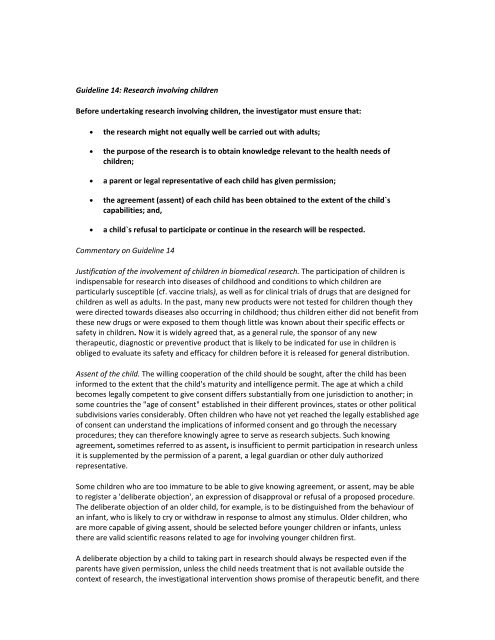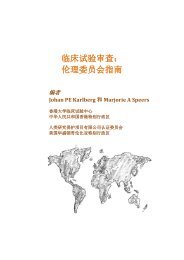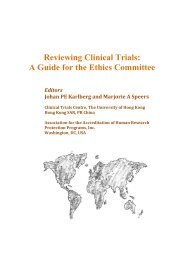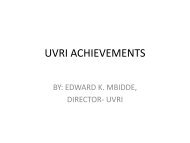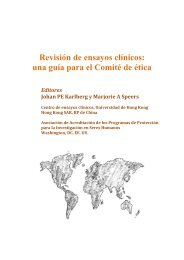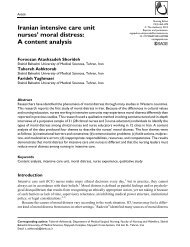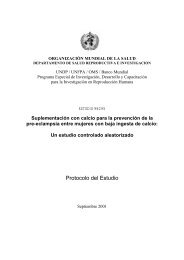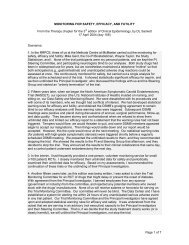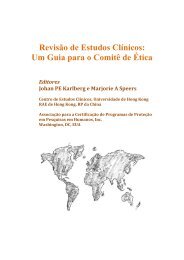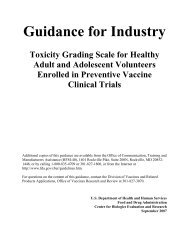Guideline 14: Research involving childrenBefore undertaking research involving children, the investigator must ensure that:• the research might not equally well be carried out with adults;• the purpose of the research is to obtain knowledge relevant to the health needs ofchildren;• a parent or legal representative of each child has given permission;• the agreement (assent) of each child has been obtained to the extent of the child`scapabilities; and,• a child`s refusal to participate or continue in the research will be respected.Commentary on Guideline 14Justification of the involvement of children in biomedical research. The participation of children isindispensable for research into diseases of childhood and conditions to which children areparticularly susceptible (cf. vaccine trials), as well as for clinical trials of drugs that are designed forchildren as well as adults. In the past, many new products were not tested for children though theywere directed towards diseases also occurring in childhood; thus children either did not benefit fromthese new drugs or were exposed to them though little was known about their specific effects orsafety in children. Now it is widely agreed that, as a general rule, the sponsor of any newtherapeutic, diagnostic or preventive product that is likely to be indicated for use in children isobliged to evaluate its safety and efficacy for children before it is released for general distribution.Assent of the child. The willing cooperation of the child should be sought, after the child has beeninformed to the extent that the child's maturity and intelligence permit. The age at which a childbecomes legally competent to give consent differs substantially from one jurisdiction to another; insome countries the "age of consent" established in their different provinces, states or other politicalsubdivisions varies considerably. Often children who have not yet reached the legally established ageof consent can understand the implications of informed consent and go through the necessaryprocedures; they can therefore knowingly agree to serve as research subjects. Such knowingagreement, sometimes referred to as assent, is insufficient to permit participation in research unlessit is supplemented by the permission of a parent, a legal guardian or other duly authorizedrepresentative.Some children who are too immature to be able to give knowing agreement, or assent, may be ableto register a 'deliberate objection', an expression of disapproval or refusal of a proposed procedure.The deliberate objection of an older child, for example, is to be distinguished from the behaviour ofan infant, who is likely to cry or withdraw in response to almost any stimulus. Older children, whoare more capable of giving assent, should be selected before younger children or infants, unlessthere are valid scientific reasons related to age for involving younger children first.A deliberate objection by a child to taking part in research should always be respected even if theparents have given permission, unless the child needs treatment that is not available outside thecontext of research, the investigational intervention shows promise of therapeutic benefit, and there
is no acceptable alternative therapy. In such a case, particularly if the child is very young orimmature, a parent or guardian may override the child`s objections. If the child is older and morenearly capable of independent informed consent, the investigator should seek the specific approvalor clearance of the scientific and ethical review committees for initiating or continuing with theinvestigational treatment. If child subjects become capable of independent informed consent duringthe research, their informed consent to continued participation should be sought and their decisionrespected.A child with a likely fatal illness may object or refuse assent to continuation of a burdensome ordistressing intervention. In such circumstances parents may press an investigator to persist with aninvestigational intervention against the child`s wishes. The investigator may agree to do so if theintervention shows promise of preserving or prolonging life and there is no acceptable alternativetreatment. In such cases, the investigator should seek the specific approval or clearance of theethical review committee before agreeing to override the wishes of the child.Permission of a parent or guardian. The investigator must obtain the permission of a parent orguardian in accordance with local laws or established procedures. It may be assumed that childrenover the age of 12 or 13 years are usually capable of understanding what is necessary to giveadequately informed consent, but their consent (assent) should normally be complemented by thepermission of a parent or guardian, even when local law does not require such permission. Evenwhen the law requires parental permission, however, the assent of the child must be obtained.In some jurisdictions, some individuals who are below the general age of consent are regarded as"emancipated" or "mature" minors and are authorized to consent without the agreement or eventhe awareness of their parents or guardians. They may be married or pregnant or be already parentsor living independently. Some studies involve investigation of adolescents’ beliefs and behaviourregarding sexuality or use of recreational drugs; other research addresses domestic violence or childabuse. For studies on these topics, ethical review committees may waive parental permission if, forexample, parental knowledge of the subject matter may place the adolescents at some risk ofquestioning or even intimidation by their parents.Because of the issues inherent in obtaining assent from children in institutions, such children shouldonly exceptionally be subjects of research. In the case of institutionalized children without parents,or whose parents are not legally authorized to grant permission, the ethical review committee mayrequire sponsors or investigators to provide it with the opinion of an independent, concerned,expert advocate for institutionalized children as to the propriety of undertaking the research withsuch children.Observation of research by a parent or guardian. A parent or guardian who gives permission for achild to participate in research should be given the opportunity, to a reasonable extent, to observethe research as it proceeds, so as to be able to withdraw the child if the parent or guardian decides itis in the child's best interests to do so.Psychological and medical support. Research involving children should be conducted in settings inwhich the child and the parent can obtain adequate medical and psychological support. As anadditional protection for children, an investigator may, when possible, obtain the advice of a child'sfamily physician, paediatrician or other health-care provider on matters concerning the child'sparticipation in the research.(See also Guideline 8: Benefits and risks of study participation; Guideline 9: Special limitations onrisks when subjects are not capable of giving consent; and Guideline 13: Research involvingvulnerable persons.)


